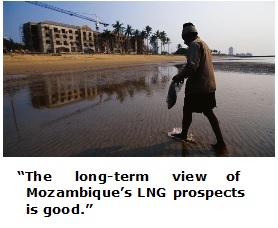 ReConnect Africa is a unique website and online magazine for the African professional in the Diaspora. Packed with
essential information about careers, business and jobs, ReConnect Africa keeps you connected to the best of Africa.
ReConnect Africa is a unique website and online magazine for the African professional in the Diaspora. Packed with
essential information about careers, business and jobs, ReConnect Africa keeps you connected to the best of Africa.


Recent political developments in Mozambique mark the beginning of an important era, says a new report.
 Recent political developments in Mozambique mark the beginning of an important era, says a new report
Recent political developments in Mozambique mark the beginning of an important era, says a new report
Mozambique's ambitious new executive must find ways to bridge a set of gaps: between the core and the periphery; between political parties – established and new; and between the interests of business and the stark fact that Mozambique remains extremely poor, according to a new report, Mozambique to 2018: Managers, Mediators and Magnates
Authored by Elisabete Azevedo-Harman, Former Research Fellow, Africa Programme, Chatham House (2013–15) and Henry Thompson, an independent Consultant, the report shows that recent political developments in Mozambique have marked the beginning of an important era.
The party of government, the Mozambique Liberation Front (FRELIMO), is clearly anxious to back the newly elected head of state, Filipe Nyusi, who – following an initial tussle with his predecessor – is apparently keen to open a different style of dialogue with his rivals both among the country’s opposition parties and within FRELIMO itself. This apparent political maturing comes at a time when the prospect of significant economic transition is gaining ground.
Opportunities Bring Challenges
Foreign investors are committing to Mozambique, and this can only have been encouraged by recent political developments. Of particular note has been the arrival of the liquefied natural gas (LNG) industry in the context of some globally significant offshore gas finds in the north. Despite likely high development costs, the market for LNG is strong – especially in East Asia.
Looking ahead by some years to 2020–25, LNG markets in the United States and Europe should also become more attractive, as domestic production winds down in the former and North Africa’s supply to Europe begins to dwindle. The long-term view of Mozambique’s LNG prospects is good – albeit more modest than spectacular. In addition to LNG development, there are significant investments under way in agribusiness (biofuels production), coal, non-hydrocarbon minerals and fisheries.
In addition to LNG development, there are significant investments under way in agribusiness (biofuels production), coal, non-hydrocarbon minerals and fisheries.
To a greater or lesser extent, however, such developments present challenges to local communities, and all have the potential to create serious conflict through the disaffection of local people. Investments have not yet reached a stage at which they are providing the government of Mozambique with taxes and its people with jobs.
Many key poverty indicators for Mozambique have largely stagnated over the past decade, and the country’s infrastructure of roads, telecommunications, railways and electricity is inadequate to keep up with the demands of investors, let alone population growth. What infrastructure that is in place is vulnerable to crippling damage by floods over much of central and northern Mozambique.
The country is also prone to serious outbreaks of political violence. The fighting that took place between April 2013 and July 2014 showed clearly that the Mozambican National Resistance (RENAMO) movement was able to arm and conduct operations in the centre of the country. While its fighters may not be able to start a civil war or a war of secession, they made a political point: RENAMO is a force to be reckoned with. In addition to political violence, there is persistent unrest in Mozambique over social issues, with food prices or land claims at the centre of most protests and outbreaks of violence.
The challenges for Mozambique’s government are interlinked. The lack of large-scale revenues and the persistence of a constrained tax base mean that it does not have the funding required to develop the roads, railways and electrification that would hugely benefit internal and external trade, and bring investment into the business sector. Furthermore, the country’s economic growth is partly offset by the scale of the ‘youth bulge’ coming on to the labour market. Unless its young people are able to find employment, any real gains in alleviating Mozambique’s persistent poverty will be lost.
Cognizant of the political sensitivities involved, and working with international donors and investors, Mozambique’s policy-makers have to select and undertake a clear and unambiguous set of measures that balance the short-term needs of commercially competitive industries – which can provide a strong return for the government – with the social needs as well as the constitutional rights and expectations of the country’s citizens.
Recommendations
Bridging divides
The new executive must find ways to bridge a set of gaps: between the core and the periphery; between political parties – established and new; and between the interests of business and the stark fact that Mozambique remains extremely poor. In sharp contrast to Mozambique’s successful elections, occasional breakdowns in security detract from the development agenda. Under the Nyusi government, there is a new imperative to address processes of reconciliation and disarmament, and its efforts should be warmly supported by the international community.
Balancing these competing interests, and maintaining both peace and a healthy dialogue among detractors, will not be easy. Expectations of resource rents run high, and are promoted by the investors themselves. Managing such expectations while shifting authority to the provinces is new political territory for FRELIMO. Its newly elected members of parliament will be busy, and will need guidance and support through the coming term. Despite the rhetoric, experience shows that – in general – good things happen slowly, while bad things can happen very fast.
Top photo: Louise Gubb/CORBIS SABA
